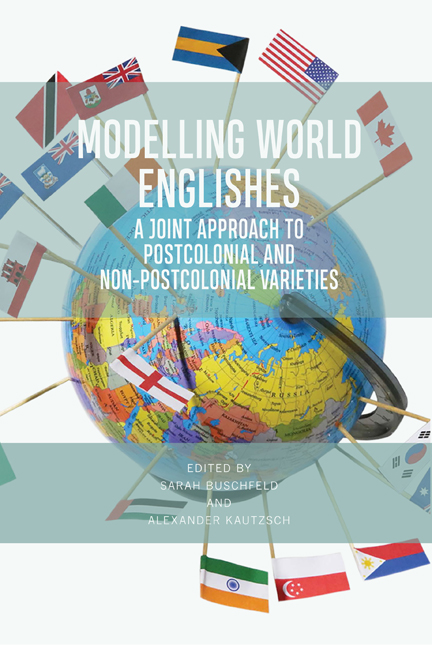Book contents
- Frontmatter
- Contents
- List of Figures and Tables
- List of Contributors
- Foreword
- 1 Introduction
- 2 English in England: The Parent Perspective
- 3 English in Namibia: Multilingualism and Ethnic Variation in the Extra- and Intra-territorial Forces Model
- 4 English in the United Arab Emirates: Status and Functions
- 5 English in India: Global Aspirations, Local Identities at the Grassroots
- 6 English in Singapore: Two Issues for the EIF Model
- 7 English in the Philippines: A Case of Rootedness and Routedness
- 8 English in South Korea: Applying the EIF Model
- 9 English in Japan: The Applicability of the EIF Model
- 10 English in Australia – Extra-territorial Influences
- 11 English in North America: Accounting for its Evolution
- 12 English in The Bahamas and Developmental Models of World Englishes: A Critical Analysis
- 13 Standard English in Trinidad: Multinormativity, Translocality, and Implications for the Dynamic Model and the EIF Model
- 14 Englishes in Tristan da Cunha, St Helena, Bermuda and the Falkland Islands: PCE, non-PCE or both? Blurred Boundaries in the Atlantic
- 15 English in Ireland: Intra-territorial Perspectives on Language Contact
- 16 English in Gibraltar: Applying the EIF Model to English in Non-Postcolonial Overseas Territories
- 17 English in Ghana: Extra- and Intra-territorial Forces in a Developmental Perspective
- 18 Synopsis: Fine-tuning the EIF Model
- Index
2 - English in England: The Parent Perspective
Published online by Cambridge University Press: 24 September 2020
- Frontmatter
- Contents
- List of Figures and Tables
- List of Contributors
- Foreword
- 1 Introduction
- 2 English in England: The Parent Perspective
- 3 English in Namibia: Multilingualism and Ethnic Variation in the Extra- and Intra-territorial Forces Model
- 4 English in the United Arab Emirates: Status and Functions
- 5 English in India: Global Aspirations, Local Identities at the Grassroots
- 6 English in Singapore: Two Issues for the EIF Model
- 7 English in the Philippines: A Case of Rootedness and Routedness
- 8 English in South Korea: Applying the EIF Model
- 9 English in Japan: The Applicability of the EIF Model
- 10 English in Australia – Extra-territorial Influences
- 11 English in North America: Accounting for its Evolution
- 12 English in The Bahamas and Developmental Models of World Englishes: A Critical Analysis
- 13 Standard English in Trinidad: Multinormativity, Translocality, and Implications for the Dynamic Model and the EIF Model
- 14 Englishes in Tristan da Cunha, St Helena, Bermuda and the Falkland Islands: PCE, non-PCE or both? Blurred Boundaries in the Atlantic
- 15 English in Ireland: Intra-territorial Perspectives on Language Contact
- 16 English in Gibraltar: Applying the EIF Model to English in Non-Postcolonial Overseas Territories
- 17 English in Ghana: Extra- and Intra-territorial Forces in a Developmental Perspective
- 18 Synopsis: Fine-tuning the EIF Model
- Index
Summary
INTRODUCTION
This chapter focuses specifically on English in England (EE). This territorial concentration deliberately cuts through the complexities of terms relating to the constituent members of ‘the United Kingdom’ and of ‘the British Isles’ (which are not the same thing – see section 2 below); in doing so avoiding grouping under one all-embracing and quite misleading name Englishes that are to be found in disparate (if politically conjoined) geopolitical entities. Further, it enables consideration of the relationship which EE has had with those other neighbouring Englishes. The overall intention is to make observations which might be relevant on the wider World Englishes stage. To this end, sections 3 to 10 conclude with ‘Reflections’ arising from their individual content, the aim of which is to draw conclusions from what has immediately preceded them and to suggest matters which might be addressed by others when postcolonial Englishes (PCEs) and non-postcolonial Englishes (non-PCEs) are being modelled. In no way should the reflections be considered obligatory to the analytic process: to many they will certainly not be a revelation, but some at least might be found helpful in furthering development of a World Englishes model as a whole.
ENGLISH AT HOME
The briefest of visits to the distinctions inherent in the political organisation of the British Isles should suffice to establish that English on its native turf is far from uniform at anything other than a quite meaninglessly coarse level of granularity. England, Wales and Scotland together properly constitute ‘Great Britain’, and together with Northern Ireland these constitute ‘the United Kingdom of Great Britain and Northern Ireland’, simply ‘the UK’. These came together politically long after English began its career in England itself. And these alone are not ‘the British Isles’, the term properly embracing two states, the UK and the Republic of Ireland, or Eire. The latter was once part of the UK, but for long now it has been quite separate. Each part of the UK and Eire has its own linguistically expressed identity, with numerous regional and social divisions evident in myriad linguistic permutations. This diversity, born of a long history of conflict and alliance spawning countless (a word carefully chosen) standard and non-standard dialects, cannot be overstated.
- Type
- Chapter
- Information
- Modelling World EnglishesA Joint Approach to Postcolonial and Non-Postcolonial Varieties, pp. 16 - 37Publisher: Edinburgh University PressPrint publication year: 2020



